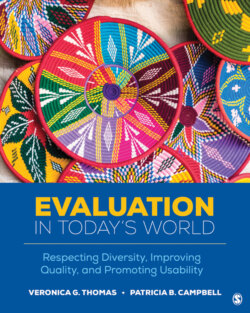Читать книгу Evaluation in Today’s World - Veronica G. Thomas - Страница 99
На сайте Литреса книга снята с продажи.
Evaluator Role, Power, Politics, and Ethics
ОглавлениеEthical issues can arise centering on the evaluator roles, power imbalances between the evaluator and key stakeholders, and evaluator privilege. Politics can also have ethical dimensions that impact an evaluator’s work. As discussed throughout this book, power and privilege are concepts that extend far beyond an individual evaluator or a particular evaluation. Frequently, relationships between the evaluator and stakeholders and between/among stakeholders are enthralled in power imbalances and hierarchical struggles. Hierarchical arrangements and power imbalances in the evaluation context exist long before the evaluator is on the scene since oppressive systems often shape the conception, design, and implementation of the program that the evaluator is tasked with studying. Evaluators are often asked to assess the effectiveness of social programs that are designed to yield a quick “magic bullet” fix to problems (e.g., racial achievement gaps, poverty) derived from years of racial and other oppressions (Thomas et al., 2018). In order to accomplish this, evaluators must develop a critical consciousness of how institutional, historical, and systemic forces limit and promote the life opportunities for particular groups. Instead of, for example, identifying delinquency, substance abuse, and violence as problems, evaluators should emphasize the root causes by examining the larger political, economic, and social forces that create persistent poverty, thus jeopardizing healthy development (Thomas et al., 2018).
In any given evaluation, the evaluator occupies multiple roles, including those of expert, knower, judge, and educator. For example, an evaluator can be an expert or program facilitator during the program implementation, a researcher when collecting and analyzing evaluation data, a judge during the reporting phase when making an assessment of program merit and worth, and an educator or advisor throughout the entire evaluation process. The roles that evaluators assume are generally all positions of tremendous power with opportunities to exercise that power in either ethically “just” or “oppressive” ways. Power in evaluation is more distributed toward the evaluator since it is, in fact, the evaluator who is studying others and generating knowledge (and not vice versa). While evaluators do not generally own the knowledge generated from their evaluations, it is still the case that their perspectives and interpretations are often privileged over those being studied in the evaluation context.
